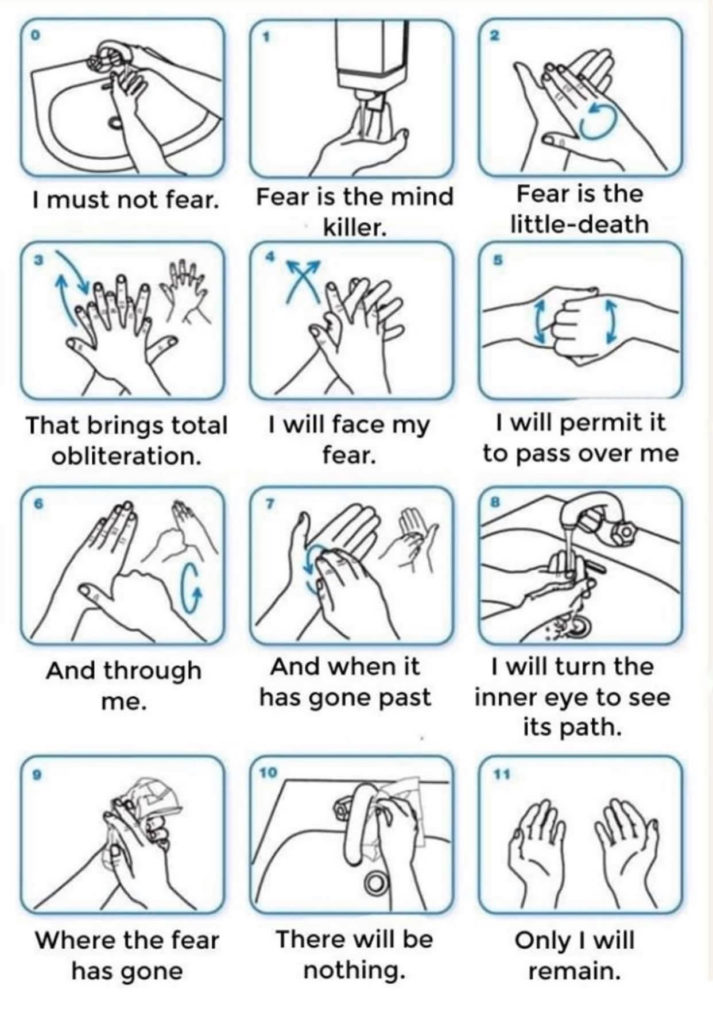Macroeconomics 116
It is a truth universally acknowledged, that a single man who starts washing his hands, must eventually stop washing them.
How often do you wash your hands? How long do you wash your hands? When you stop, how certain are you that you have eradicated every last pathogen?
The Center for Disease Control has a five-step breakdown on how to wash your hands, and step three instructs to scrub for at least 20 seconds.
A lot of sources suggest to hum “happy birthday” twice to get the timing right, but my personal recommendation is to recite the Bene Gesserit Litany Against Fear.

As I saw the possibility of a pending pandemic growing, I started washing my hands more often and more thoroughly. I suspect many of you did the same. Here’s the thing, though. There are tradeoffs for increased caution, and everyone is going to come to different conclusions on where the acceptable tradeoff point is. Should I wash my hands every time I touch something someone else may have touched? Should I wash my hands up to the wrist, or sneak a few inches of forearm coverage in? What if I stop at 19 seconds, how would that affect my odds of infection?
I started thinking about this early on, when there was a lot of chatter about “commonly missed areas when hand washing“, along with accompanying pictures and guidance. Apparently, many of us had been doing this wrong all along, and we are lucky to have survived. I have a few questions. Some parts of the hand are more likely to have germs on them, right? If you break your hands down into square inch sections, the hot spots would be your palms and fingertips, right? So, how likely is it that the parts of our hand we use to touch things are not getting washed when our hands are touching each other?? That would be odd, to say the least.
Phrased another way, yes, I may miss scrubbing the back of my knuckle on my ring finger from time to time, but, thankfully, that particular area also happens to be one of the less likely spots on my hand to have germs in the first place! Do you see the tradeoffs at play?
Want an out-of-body experience? Think about this tweet next time you wash your hands.
Saw some girl tweet
— Jonathan (@BeguJonathan) September 25, 2019
“Saw some dude tweet
"you dont really wash your hands….they actually wash each other while u just stand there and watch"
and i haven't been the same since”
And I haven’t been the same since
32.5k Rt 104k likes
This is also why there is such a big difference between shaking hands and a fist bump, by the way. All human-to-human contact does not spread germs equally, and the difference between palm-to-palm and knuckle-to-knuckle is significant.
Even the most OCD germaphobic person alive doesn’t spend the entirety of their waking life washing their hands. There is a point where additional cleanliness isn’t worth additional time and the logic breaks down. “I need to be clean so I can stay alive so I can keep cleaning myself” is unsustainable.
In other words, our decision-making goals are never to minimize risk, but to optimize it.
Do you like how I just Jedi-mind-tricked everyone into agreeing on this topic? I’m pleased, and, no, I don’t feel bad about the click-baity headline—it holds up.
Welcome to the lockdown post, everyone! Thanks for coming.
Yesterday, Governor Abbott announced Texas will be starting the first phase of his plan to re-open the economy this Friday. This is big news. The basic details are that a whole bunch of businesses (retail stores, restaurants, movie theaters, malls, libraries, museums) are allowed to re-open at 25% capacity. Licensed health care professions can also resume their practices, but must reserve 15% capacity for potential COVID-19 related cases. Counties in Texas with fewer than 5 cases can open at 50% capacity, and, depending on how the first stage goes, the next stage is set to go into place on May 18.
I wanna have the same last dream again
The one where I wake up and I’m alive
This plan seems reasonable, and it accounts for some of the differences between rural and urban areas. I stand behind my bold claim that having a plan is better than not having a plan, and I expect us to learn a lot as the different states try out different approaches to unlocking, or not unlocking.
The main thing to pay attention to at this point is the “secondary flare-up” and how we react to it. As states start to unlock, there will be more COVID-19 cases, and more deaths. How much is too much? How will the media respond? The single biggest variable hasn’t changed, for me, in weeks. It’s testing. What is our testing capability, how quick is it, and how accurate is it?
Secret crowds rise up and gather
Hear your voices sing back louder
On the last day of real class, I told my students if social distancing measures are put into place, and they accomplish their intention of controlling the spread, then it will look like they were never necessary in the first place. If they weren’t necessary, then it will also look like they weren’t necessary. We should hope that it looks like they weren’t necessary; that is the best possible outcome.
Even now, this is endlessly fascinating to me. In nearly every scenario, the people who are strongly disagreeing on the scope and duration of these lockdowns will still be in disagreement on what the best strategy was months, years, decades from now (if they live that long). Each side is carefully compiling data and evidence that supports their beliefs, but how many people have actually changed their minds recently? It’s much more likely you’re still holding the same basic mentality you started with; do not underestimate the power of confirmation bias.
What side am I on? I’m with him.
“There are three kinds of lies: lies, damned lies, and statistics.”
-Mark Twain
If, like me, you have noticed similar patterns between this lockdown debate and the disagreements surrounding climate change, or vaccinations, and even noticed that the same people are taking the same sides, more or less, there’s a reason for that.
Broadly speaking, each of those conversations involves topics with negative externalities, or situations where one person’s decision, based on their own costs and benefits, has “spillover” costs that negatively affect other people who were not part of the decision-making process. Second-hand smoke is the go-to example, and externalities are everywhere. It’s why we have laws against blaring boomboxes on subways, or running naked through the streets. It definitely applies to pollution and viruses. Demetri Martin has an externality joke about how the only time someone says “it’s a free country”, is when they are being a jerk, and I’m tempted to agree with him.
The two categories people tend to fall into are a) protecting individual liberty at the expense of group outcomes, or b) protecting group outcomes at the expense of individual liberty. The solution to negative externalities is to make the decision-maker aware and accountable for the the full cost of his decision, through persuasion (information) or coercion (force). Internalize the externality.
I am in education, in large part, because of my strong belief in the power of information to improve decisions, thus improving the world. I don’t know what the best plan is right now, but I can narrow it down via process of elimination.
It’s wrong to say “I’m going to do whatever I want, and I don’t care who it affects”. It’s wrong for the government to put the same lockdown restrictions on every county and city and individual, when, as always, the details matter. Narrowing this down, it’s wrong to focus on restarting the economy and ignore the resulting loss of human life from increased spread of disease, and it’s wrong to say “if we can save just one person from dying from this virus by extending the lockdown, it’s worth it”.
That last bit of rhetoric is more than wrong, it’s dishonest. It’s framing people who disagree with your opinion as pro-death, and that’s not what this debate is about. And, by the way, you don’t have to be a general sending men into battle to actively weigh the value of human lives versus other objectives and goals. We could give every person who gets on every airplane a parachute, but it’s not worth the cost. We could ban pools, or double-down—why don’t we ban swimming entirely? It’s not worth the cost, that’s why.
The value of each individual human life is a paradox, because it’s both infinite and universal. Because it’s infinite, we aren’t comfortable associating it with numerical values, and because it’s universal, we aren’t comfortable prioritizing one over another. Once again, we arrive back at the concept of government interference picking winners and losers, and tradeoffs being inescapable. For a deeper exploration of this paradox, you should watch my favorite high school commencement address ever, You Are Not Special.
The other day I was listening to a podcast and the host said he was going to have to start making up horror stories about kids getting sick and dying in order to keep his kids in line. That’s also wrong, and it succinctly summarizes the concept of the “nanny state”. The state shouldn’t lie to “protect” me, and it shouldn’t act like it cares more about my health and well-being than I do. [Speaking of lying/protecting, did everyone see the declassified UFO vids yesterday?!] If you show me all the data on how much safer wearing a seatbelt makes me while doing the most dangerous thing most people do on a daily basis (getting into a car), that should be it, end of discussion. I think it’s wrong for the government to make laws requiring seatbelt usage, and even more wrong to pull people over and fine them for not doing so. Make no mistake, I’m a pro-seatbelt guy, even more so after surviving that rollover wreck in Mexico. I have no doubt I would have died without my simple, single strap seatbelt. Just don’t try to force me to wear it and we’re cool.
One more thing I think is wrong. It’s wrong to cheer on the sidelines when government officials get overeager about enforcing quarantine regulations. We shut down a majority of our economy, ended sports, closed schools, and totally changed our behavior en masse in a completely unprecedented way, and those hundreds of millions of billions of non-interactions are the equivalent of washing our hands for 19 seconds. Just because one dude is ignoring a stay-at-home order and paddleboarding in the ocean by himself doesn’t mean it’s going to erase the “work” the rest of us are putting it. One dad playing t-ball in the park with his daughter shouldn’t be an arrest-able offense. If people want to attend a drive-in church service and stay in their cars, let them.
When China locked down Wuhan, it was immediate and total, a solid 40-second scrub. You can find any number of stories on this from early on in the lockdown, including banning private vehicles from the streets, going door to door to take temperatures and remove sick people from their homes, or just welding apartment doors shut. And, it *appears* their extreme measures were effective. The ** means I’m taking a “don’t trust, and verify” approach to official Chinese communications from here on out: they kicked foreign journalists out of the country on March 17th, and on March 19th they announced they had no new cases of COVID-19. Okay.
What is the acceptable tradeoff between individual liberty and government intervention? How do you solve negative externalities? I strongly prefer persuasion, but I don’t rule out coercion.
If you happen to be confronted by a wannabe tyrant in the coming weeks who asks you why you aren’t following their particular preferences for how people should be acting, your response should be simple.
Why did you stop washing your hands?


